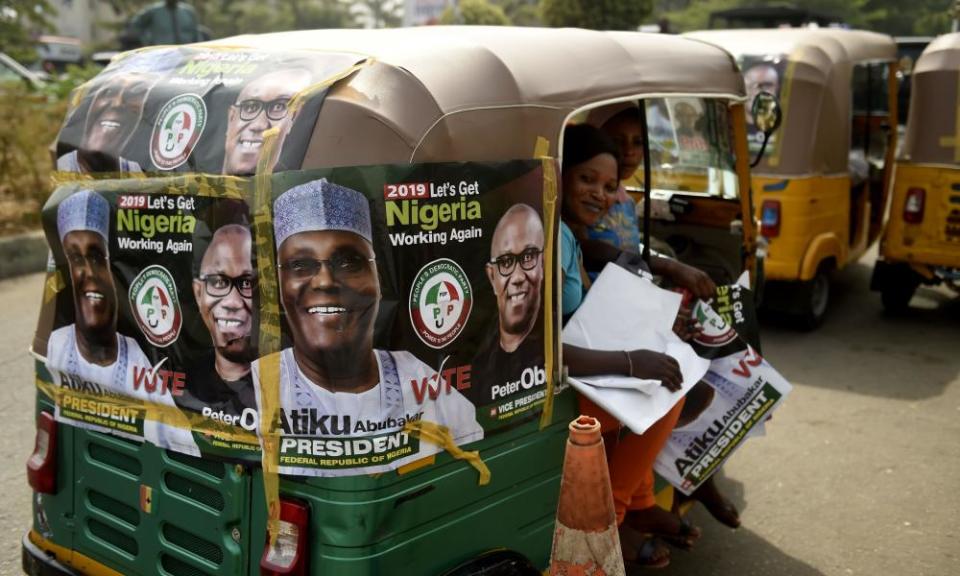Nigeria’s new president is bound to fail – whoever wins the election

Every few years, a single resolute idea about the best way to solve the problems of Nigeria grips the nation. It begins from someone’s fanciful thoughts but gets shared so much that, before long, nearly everyone begins to parrot it.
When the last dictator, General Sani Abacha, died in 1998, nearly everyone became persuaded that “only a civilian will save us!” A year later a civilian president, Olusegun Obasanjo, took office. Two terms later, Nigerians were so disillusioned that the next idea took off with even greater fervour: “We have been ruled by military elites most of whom had no higher education. We need a president with a good education!” So we got that in 2007, in Umaru Yar’Adua, who had a master’s in chemistry. When he died in office, our desire was fulfilled once more in the ultimate PhD-holding president, Goodluck Jonathan. Neither saved us.
This year the rallying cry is: “Only a young leader can save us. The old guard have nothing to offer!” Politicians seized on this common belief before the presidential elections that had been scheduled to take place on Saturday. At least three contestants ran solely on the basis of their “youth”, and there was a shamelessly named “Young Progressive party”. Though the “young” candidates were given little chance, many people based their votes on this fad. But even those who voted for the old guard, in the shape of the two frontrunners – incumbent President Muhammadu Buhari and Atiku Abubakar – were doing so in hope rather than expectation.
Nigerians often vote with a desire for a miracle. We know that the tools are available to improve the nation (oil, population, a young and educated potential workforce); we know too that the politicians will not put them to good use (due to greed, tribalism, “corruption”); yet we expect that they will, anyway. We are accustomed to their failing and, in time, the average Nigerian will move on and continue to struggle as before. And for this year’s election, the embarrassing incompetence that resulted in its rescheduling has already battered the faith of many even before a single vote is cast.
To be fair, a few regimes have made an effort to improve things, but the problems in Nigeria are so broad, so deep, so entrenched that they can render even the most radical optimist faithless. In 2018 Nigeria overtook India, whose population is five times larger, as the country with the highest number of poor people. The north-east state of Borno is still plagued with an Islamic militant insurgency. There is insecurity even within the cities as desperate people find an easy money-making device in kidnapping people for ransom and sometimes for occult rituals. The net result is an exodus from the country, to such an extent that the medical sector seems to be on the edge of collapse – it is estimated that there are fewer than 40,000 doctors currently practising in a nation of 170 million.
For me, the underlying problem is the lack of a coherent national value system. Currently it’s a mix of various tribal traditions and western values cast within a western framework, leading to a unique political system that is not democracy but one that can best be described as mitigated chaos. Since chaos breeds monsters and monstrosities, the value system has continued to degenerate despite Nigerians wanting badly for it to improve (many voted for Buhari in 2015 in the hope that he would tackle corruption). But it is now an epidemic, with distrust infecting every sector of Nigerian society.
Since the new president is bound to fail given the current system, the best one can hope for is for the chaos to be mitigated to a more manageable degree. And I have some drastic solutions I think Nigerians should insist upon.
The new president must stipulate that every political office be unpaid; we should practise charitable service politics and remove some of the incentives for politics as vehicle for self-enrichment. All political officials and their immediate family members should be banned from travelling out of Nigeria for 10 years from the day they are elected: this would force politicians to develop infrastructure in Nigeria rather than ignore it simply because they can travel abroad for better services.
No non-government official should be allowed police escorts or security guards: this would force the wealthy elite to confront the insecurity that everyday Nigerians face. To tackle the embezzlement of public funds, every government-issued contract must be published on a designated online site so they can be monitored by external accountability bodies.
The situation has deteriorated so much that no youthful leader, no member of the old guard, no intellectual, can repair the damage within a single term. Without extreme measures such as these, the new president will make no difference, no matter their good intentions.
• Chigozie Obioma is an author. His most recent novel is An Orchestra of Minorities

 Yahoo News
Yahoo News 